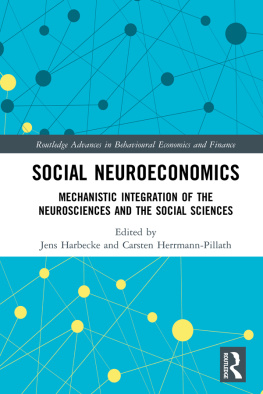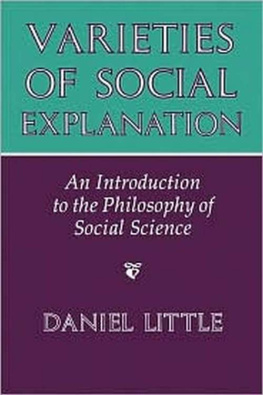Philosophy of Social Science

Westview Press was founded in 1975 in Boulder, Colorado, by notable publisher and intellectual Fred Praeger. Westview Press continues to publish scholarly titles and high-quality undergraduate- and graduate-level textbooks in core social science disciplines. With books developed, written, and edited with the needs of serious nonfiction readers, professors, and students in mind, Westview Press honors its long history of publishing books that matter.
Copyright 2016 by Westview Press
Published by Westview Press,
A Member of the Perseus Books Group
2465 Central Avenue
Boulder, CO 80301
www.westviewpress.com
All rights reserved. Printed in the United States of America. No part of this book may be reproduced in any manner whatsoever without written permission except in the case of brief quotations embodied in critical articles and reviews.
Every effort has been made to secure required permissions for all text, images, maps, and other art reprinted in this volume.
Westview Press books are available at special discounts for bulk purchases in the United States by corporations, institutions, and other organizations. For more information, please contact the Special Markets Department at the Perseus Books Group, 2300 Chestnut Street, Suite 200, Philadelphia, PA 19103, or call (800) 810-4145, ext. 5000, or e-mail .
Library of Congress Cataloging-in-Publication Data
Rosenberg, Alexander, 1946-
Philosophy of social science / Alexander Rosenberg, Duke University. -- Fifth edition.
pages cm
Includes bibliographical references and index.
ISBN 978-0-8133-4990-9 (e-book) 1. Social sciences--Philosophy. I. Title.
H61.R668 2015
300.1--dc23
2015007880
10 9 8 7 6 5 4 3 2 1
To the memory of Blanca N. Rosenberg, mentor and teacher to two generations of students in the School of Social Work, Columbia University, 19581979
Contents
A generation is a lifetime in the history of a textbook. I wrote the first edition of this work in the late 1980s, long before the advent of online resources and well before the current proliferation of handbooks, encyclopedias, companions, and guides to every discipline and subdiscipline. Four revisions later, however, this old-fashioned introduction to the philosophy of social science is holding its own in the online informational environment of the twenty-first century. What is the reason for this? Some hypotheses are disobliging and disconfirmed: it cant be that no one cares enough about the subject; there are, after all, by Google Scholars account, a dozen books with titles that are variations on The Philosophy of Social Science. Nor can it be that no one plugged into the web is interested in this subject or my take on it: I once had to threaten legal action to get a plagiarized version of the second edition taken down from a website.
To explain the persistence of this book across twenty-four years and four editions, I propose this hypothesis: its particular approach to the philosophy of social science has persisted because of the merit of the books central premisesthat social scientists must take sides on philosophical problems, whether they like it or not, even whether they know it or not, and that the problems of the philosophy of social science are all versions of one or another fundamental problem of philosophy: problems of metaphysics, of epistemology, of ethics.
Its central premisethat the philosophy of social science is a way of coming to grips with the perennial problems of philosophymakes this volume different from the other works that share its title. It does not pretend to be a tour guide through isms and fashions, nor a prcis of major theories and findings in social science. This is a work of philosophy as well as a textbook.
A great deal has changed in the social sciences since the 1980s, when the first edition was gestating. Economics, for example, has greatly changed, owing to events in the economy and changes in the social sciences that it has refused to take seriously, especially in cognitive social psychology, experimental economics, and evolutionary game theory. Even since the fourth edition, a new subdiscipline has gone mainstream: neuroeconomics. Economics has also succumbed to attacks on its moral neutrality and indifference to application in human development. These too have made the field recognizably more like the other social sciences it once feigned to distain.
Meanwhile, anthropology, sociology, and social psychology, along with politics, have been swept up in a tsunami of Darwinian analysis originating from tectonic changes in evolutionary biology and biological anthropology. Owing to the zealperhaps trop de zleof the second and third generation of sociologists, evolutionary psychologists, and gene-culture coevolutionary theorists, there is still, after thirty or forty years, no end in sight to the Darwinization of the social sciences.
Another great change in social science since the first edition of this book is the increasing willingness of European students of human affairs to be influenced by naturalistic, empirical, and data-based approaches to social science. The empiricist and quantitative approaches to the sciences of human affairs had their origins in European thinkersDurkheim, Weber, Walras. But that approach was eclipsed and effaced in the middle years of the twentieth century by Marxism, the Frankfurt School, phenomenology, structuralism, postmodernism, deconstruction, and critical theory. Now the European philosophy of social science is moving back toward an appreciation of the older European tradition of social research that English-language social science maintained through the twentieth century. But the Europeans bring their intellectual tradition along to this new exchange. This raises questions of compatibility that few address.
All the social sciences have become much more sensitive to, and much more influenced by, theories and findings that reflect the experience and perhaps also the special informationif not exclusive knowledgeof women, ethnic, racial, and other largely marginalized groups. How to incorporate these new voices and thoughts remains a vexed matter. In this fifth edition, I devote more discussion to this question.
However, these changes in the social sciences have brought along with them not so much changes in the philosophical questions they raise, but a new vocabulary for addressing the persistent philosophical questions that face the social scientist. This edition reflects the new vocabulary of the human sciences, while continuing the previous editions insistence that the problems social science faces are old wine in new bottles, but just as intellectually intoxicating as ever.
The fourth edition added much new material on the role of models and equilibrium explanations in economics; new discussions of how speech acts create norms and thus construct social practices and institutions; the problem of spontaneous order in the creation of institutions; and the relationships of Rawlss moral theory to social research and Sens capacity theory to the broad problem of how facts and values intersect. Besides a fuller treatment of feminist philosophy of science, this fifth edition adds a discussion of the ethics of care that sometimes accompanies feminist views, a discussion of how advances in neuroscience bear on the social sciences, not just in neuroeconomics, along with an exposition of postmodernist approaches to knowledge.
Next page







